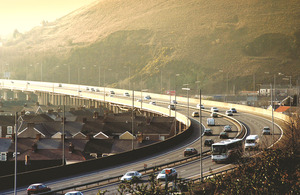Safer drivers, safer roads
New rules announced that allow the police to take immediate action against motorists who fail roadside eye tests.

The police will be able to take immediate action against motorists who fail roadside eye tests under tough new rules introduced today (7 February 2013) by Road Safety Minister Stephen Hammond.
The Driver and Vehicle Licensing Agency (DVLA) has worked closely with the Association of Chief Police Officers (ACPO) to introduce a new system to deal with roadside eyesight test failures more quickly. Under the new rules a licence can be revoked in a matter of hours rather than days.
The new system enables the police to notify the DVLA electronically with details of eyesight test failures allowing a notice of revocation of the licence to be issued to the motorist within hours. Previously, the Police notified DVLA in writing or by fax which in some cases meant that the revocation of the licence could take up to 4 days.
All drivers must be able to meet the eyesight standard for driving by reading a number plate from 20 metres - this can be easily checked by the police at the roadside. A motorist who drives when unable to meet this standard is committing an offence and will have their licence revoked by DVLA. Once revoked, a licence will not be returned until a driver can demonstrate that their eyesight meets the required standard.
Road Safety Minister Stephen Hammond said:
Reducing road casualties is a top priority for the government and our licensing rules play an important part in keeping our roads safe.
All drivers have a responsibility to make sure they are fit to drive, every time they get behind the wheel and this includes making sure they meet minimum eyesight standards.
The DVLA and the Police have worked closely to streamline the process for revoking a licence when the police identify that a driver’s eyesight is inadequate, which now means that any driver who fails to meet the necessary standard may have their licence revoked in a matter of hours rather than days.
ACPO lead on roads policing, Chief Constable Suzette Davenport, said:
Police are dedicated to improving road safety and this is another excellent example where making some changes to the way officers work will greatly enhance that aim.
We are pleased to have been working closely with DVLA on this matter and we are confident this new process will give police the ability to fast track those drivers found to have inadequate eyesight for driving, and therefore likely to cause unnecessary danger to other road users.
We want to reassure the public that where we can improve road safety from a policing perspective, we will aim to do just that.
Drivers can easily check if they are up to the required standard by ensuring that they can read a number plate from 20 metres away. If they cannot meet this standard then drivers should seek advice from an optician.
Notes to editors
The changes in procedures apply from 7 February 2013.
This service will be available between 8am and 9pm. Roadside eyesight tests can only be carried out in daylight.
On evenings and weekends, where the police deem the circumstances merit immediate action, they can use powers to impose bail conditions. These can include requiring the person not to drive as a condition of bail. If a person subject to a no-drive condition broke it, he/she could be taken to court to reconsider the question of bail.
Press office
DVLA Press Office
Longview Road
Morriston
Swansea
SA6 7JL
Email [email protected]
Only for use by journalists and the media: 0300 123 2407